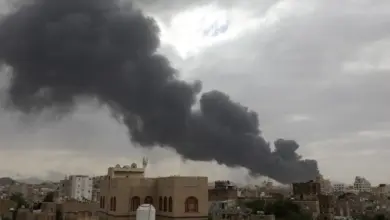
Two senior army commanders from Saudi Arabia and the United Arab Emirates were killed along with two Saudi soldiers in Yemen as fighting with a Houthi militia flared before Tuesday's expected peace talks, state media reported on Monday.
Sultan Mohammed Ali al-Kitbi, an Emirati officer, was killed near Taiz, state news agency WAM reported on Monday. Photographs of Abdullah al-Sahian, a top Saudi officer, were displayed by Saudi-owned al-Arabiya al-Hadath channel on Monday alongside Muslim verses of mourning.
The Houthi militia said via its own media outlet that the two had been killed in a rocket attack on the Red Sea coast. The militia, alongside forces loyal to former president Ali Abdullah Saleh, has been battling fighters backed by Gulf states.
The Houthis and Saleh's former political party, the General People's Congress, are sending representatives to Switzerland on Tuesday for talks with Yemen's internationally recognized government under President Abd-Rabbu Mansour Hadi.
A seven-day renewable ceasefire is scheduled to come into effect on Monday to coincide with the talks. Two previous attempts at ceasefires, in May and July, were followed by accusations of breaches by both sides.
Saudi Arabia led an Arab coalition in a military campaign from late March to stop the Houthis, allies of Riyadh's main regional foe Iran, from taking complete control of Yemen after they had advanced south last year, seizing the capital Sanaa.
The campaign has succeeded in retaking the southern port of Aden and the northeastern city of Marib but has failed to oust the Houthis from Taiz or end attacks on the Saudi border that have killed scores of the kingdom's soldiers.
Beyond the main theatre of conflict, Al-Qaeda in the Arabian Peninsula has seized control of much of the province of Hadramawt and Gulf-backed forces have failed to prevent attacks in areas they control by Yemen's wing of Islamic State.
Western countries that back Saudi Arabia say they are increasingly alarmed at the humanitarian cost of the war, in which more than 5,000 people have been killed, including more than 2,000 civilians. It has also pushed Yemen to the brink of famine.



